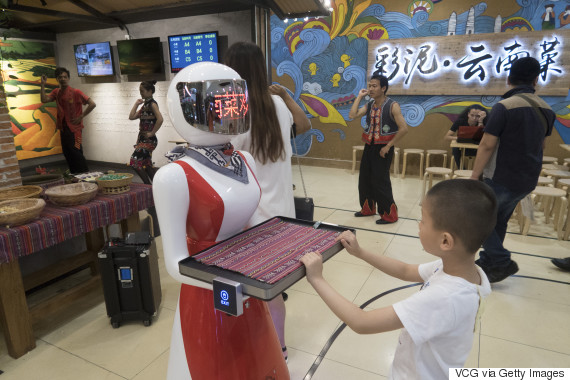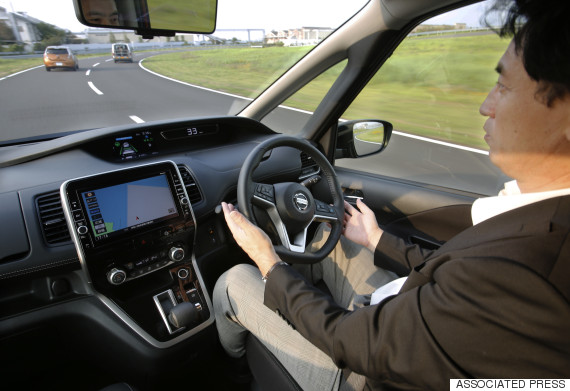
Let's start with a small test.
When was the following text published -- in 1961, 1987 or last week?
The number of jobs lost to more efficient machines is only part of the problem. What worries many job experts more is that automation may prevent the economy from creating enough new jobs ... In the past, new industries hired far more people than those they put out of business. But this is not true of many of today's new industries ... In the past, new industries such as autos and household appliances used relatively unskilled workers. Today's new industries have comparatively few jobs for the unskilled or semiskilled, just the class of workers whose jobs are being eliminated by automation.
The correct answer? 1961.
The quote is from a Time article published in February of that year but it could have been written last week. It could have also been written in 1970, 1987, 1993 or any other time in the past half century. Worries over new technologies destroying jobs have become chronic -- and up to this point, unfounded.
It's not difficult to imagine a demagogue like Trump promising that he will ban the use of robots and other 'job-killing' technologies.
Thanks to new technologies, new industries emerged that created more jobs than were destroyed and increased not only productivity, but also workers' incomes, something the economist Joseph Schumpeter predicted in 1942. He called this phenomenon "creative destruction" -- a "process of industrial mutation ... that incessantly revolutionizes the economic structure from within, incessantly destroying the old one, incessantly creating a new one."
His theory has held true. Until now.
There are those who believe this time is different and that the job destruction created by technological advancements is of unprecedented speed and magnitude. As economist Eduardo Porter recently wrote, "new technology does seem more fundamentally disruptive than technologies of the past."

The worry is that new industries and occupations that will potentially be created won't come in time and won't be enough to provide jobs and incomes for the millions of workers displaced by new technologies. In the past few weeks, I had the opportunity to visit a handful of centers of innovation and speak with some of the world's leading experts in technology information and robotics. As is usual in this environment, there was an air of contagious optimism. But there was also a lot of worry about the impact new technologies would have and many doubts about the societal, economic and political capability to adapt to it.
The CEO of a well-known technology company told me, under the condition of anonymity:
We will soon launch a robot that can perform tasks currently done by people with a high school education or less. The robot will only cost $20,000. We're not the only ones; our competitors across the world are working on similar projects. When these cheap, efficient and reliable robots become commonplace, I have no idea what jobs could be given to people who don't have skills above a high school level. I also think this technological revolution is inevitable; I'm not sure what the solution is.
Meanwhile, Uber recently announced it has begun tests with driverless cars. And they're not the only ones -- Google, Mercedes-Benz, General Motors, Toyota and Tesla are just a few of the dozens of companies investing in this technology. Driverless cars are as inevitable as the $20,000 robot. Andy Stern, the former president of the Service Employees International Union, said that the popularization of driverless vehicles will eliminate millions of jobs. Stern noted that "employing 3.5 million people, truck-driving is the largest profession in 29 states in the U.S. So introducing self-driving trucks means replacing 3.5 million jobs."
But Marc Andreessen, one of Silicon Valley's most respected investors and a cofounder of Netscape (among other companies), has a much more positive and drastically different opinion. As he wrote in the Financial Times, "Robots will not eat the jobs but will unleash our creativity ... To argue that huge numbers of people will be put out of work but we will find nothing for them -- for us -- to do is to short human creativity dramatically. And I am long on human creativity."
Worries over new technologies destroying jobs have become chronic -- and up to this point, unfounded.
Andreessen is right. But we desperately need to encourage the maximum amount of human creativity to make this transition less traumatic. How to guarantee a certain level of income for those who suffer the negative consequences of this revolution has to be part of any conversation about the incredible potential of new technologies.
Is giving away money the solution we've been looking for?
Recently, Switzerland held a referendum vote to decide whether the government would give citizens about $2,500 a month for doing absolutely nothing. Although the vote didn't pass and was never expected to, it may be a significant precursor to an emerging global trend.
In fact, many countries are already testing the idea of giving their citizens a minimum, no-strings-attached income. In Finland, the government will choose as many as 10,000 adults at random and will give them between 500 and 700 euros a month with the purpose of measuring the effects the money has on their propensity to work and on their life decisions. If the trial is successful, the Finnish government could implement the policy at a national level. Similar experiments are taking place in Canada, the Netherlands, Kenya and other countries.

The problems and defects with this idea are obvious. Having a guaranteed income could discourage work. Giving someone a material compensation without something of value produced in exchange is questionable from economic, social and ethical standpoints. The risks of corruption and political favoritism in the selection of beneficiaries are high. And, of course, this isn't a cheap initiative. These types of subsidies could turn into a huge burdens for the state and create enormous chronic deficits in public budgets.
And yet, despite all its defects, a minimum income guarantee may well become an inevitable policy. There is no doubt that globalization and new technologies have created infinite new opportunities for humanity. From reducing global poverty to medical advances and empowering historically marginalized social groups, progress is obvious.
But the negative effects are also obvious. Increasing inequality, the destruction of jobs and shrinking salaries -- especially in the U.S. and Europe -- all have some link to globalization and new technologies. And all these negative effects feed into the populism and toxic political extremism that we see taking hold of many countries today.
Despite all its defects, a minimum income guarantee may well become an inevitable policy.
As jobs continue to be lost due to accelerating technological progress, concern that not enough new ones will be created fast enough is valid. Faced with this situation, the world has responded in three main ways.
1. More education and training for workers displaced by technology. This should be a priority. But the reality is that, while there have been occasional successes in this field, the overall results of these efforts have been disappointing. In the U.S. for example, the government spends a meager 0.1 percent of gross domestic product on job retraining and similar efforts. In the majority of countries -- even the most advanced ones, programs designed to help technologically displaced workers have been poorly funded, used ineffective teaching techniques and have been run by inefficient bureaucracies. Improvements need to be made urgently.
2. Isolationism. Donald Trump is just one example of the many politicians proliferating in the world who promise to protect jobs by reducing the number of immigrants competing for them, as well as the volume of low-cost imports that displace local production. It's not difficult to imagine a demagogue like Trump promising that he will ban the use of robots and other "job-killing" technologies.
The fact that these policies are not a solution and in many cases would not even be implementable doesn't seem to be an obstacle for millions of people who believe in the populists' promises. It seems inevitable that some countries will end up adopting these bad ideas.
3. More guaranteed minimum incomes. That's right. Giving away money may seem like an outrageous idea. But a world in which nine low-cost robots can do the job of 140 workers (in a Chinese factory) is a world that is open to evaluating all the options. Even the ones that may seem -- or even be -- outrageous.
High and permanent levels of unemployment are unacceptable and unsustainable, which is why we must be willing to try everything -- and, at the same time, understanding that governing rarely means choosing between a great policy and a terrible one. More often than not, those who govern are forced to choose between a catastrophic policy and a defective but workable one. Guaranteeing a minimum income may be one of the latter.

